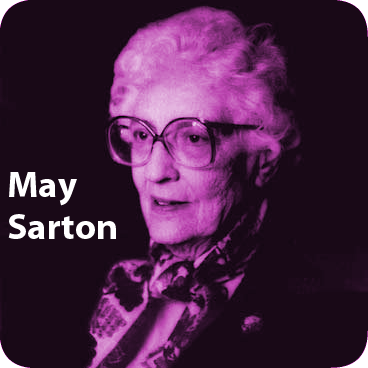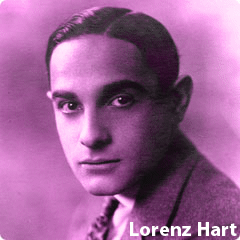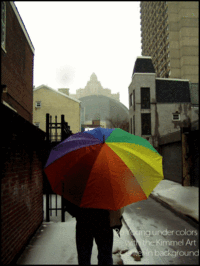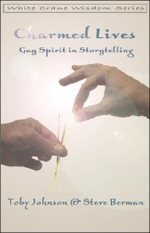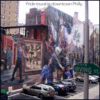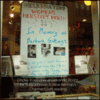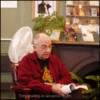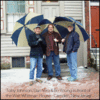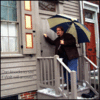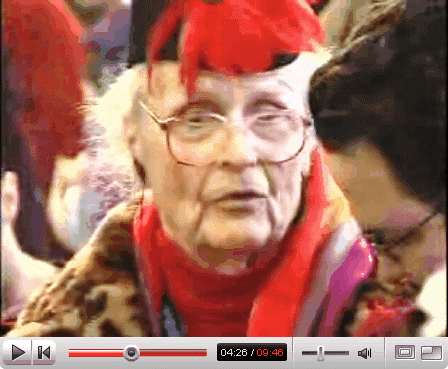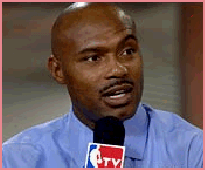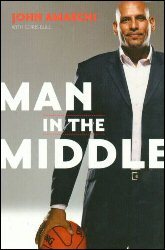From the Editors

Bo: I think there was probably as much consternation about doing an issue on “movies” as there was about doing the issue on “food.”
Dan: I didn’t think it’d be controversial. I mean everyone loves movies. At the very least everyone loves talking about movies. We’ve been told by our faithful readers — when we hear from them (ahem—a blatant plug for Letters to the Editor) that we need to lighten the topics. “Don’t do so many heady, serious themes all the time.” So we try to liven them up with some amusing themes — to use Frank O’Hara’s term. He defined something as amusing as an artwork that spoke to his muse…that a-Mused him. This is certainly the case with material we’re covering and also the conversation with Mark Thompson in this issue about fellow travelers.
Bo: They’re a fitting companion to the four portraits from the touring Fellow Travelers show we’re sponsoring. I’m just sorry we don’t have enough space to run more of them in the issue. But…on to the issue at hand. So, where were you and how old were you when Making Love came out?
Dan: Well, that’s going to date me. Making Love came out in 1982 so I would’ve been 15 years old at the time. But I remember the hubbub that occasioned the film. I remembered hunky Harry Hamlin from the Clash of the Titans movie a few years before and it was one of those films that caused Gay ripples in my consciousness way down in South Texas. So was Cruising, which was a big film with Al Pacino. Of course it’s an awful movie for many of the reasons Gay film critics have mentioned, but it was also a film on Gay subjects and it opened up the possibility that Gay people were out there somewhere.
Bo: I don’t think anyone can honestly make the argument that movies, film, cinema, isn’t an important component of “Gay culture” and always has been.
Dan: Well, it’s a mass medium and as such it has presented views of Gay life. I was talking to a friend of mine about the old Doris Day/Rock Hudson movies. He has teen-aged daughters who are pretty savvy and hip and they just love those old films. He’d gotten them three of the films in a DVD package called “The Romance Collection.” We were talking about how those films have a valance they didn’t have when they first came out. Movies like Pillow Talk are perfect little films because now, in retrospect, they tell a tale about the ridiculousness of gender lines. I mean Rock playing straight, playing Gay “mama’s boy” is funnier in hindsight. It renders the conventions ludicrous on so many levels.
Bo: I think one of the reasons Gay folk love movies so much is it’s a reflection of the “play acting” we all experience in our own lives — of “acting” straight. We relate on a very deep, psychic level to the medium. So when someone like Rock shows up, well, there’s just all this double entendre and subterfuge and wink-wink that we all are in on and straight culture may or may not be.
Dan: This might be the moment to talk about Vito Russo. His work was so helpful in helping me make connections to all these movies I enjoyed as a kid. I’m so happy to have Arnie Kantrowitz’s memoir of Russo in this issue. It seems like a proper act of paying due homage to the foremost Gay Cinema Maven.
Bo: It was only a matter of time before Gay Lib got into the movies. That’s the mirror America uses to look at itself and create its own mythology, which Vito so beautifully illustrated. I think another reason movies are so important to Gay folk has to do with how important it is as a tool and how important it is to American culture. It is probably the single most important export in the American economy.
Dan: But how telling is it that the healthiest depictions of Gay life aren’t usually American? Some of the best Gay films I’ve seen of late are films from France, Germany and England. The American Gay trope, even when it’s helmed by Gay creators, is mired in alienation, despair and death. How many times have we seen a Gay film from another country and thought, “if this were an American film, it’d end with a shooting or suicide.” Films like Cachorro (Bear Cub) from Spain, Sommersturm (Summerstorm) from Germany, Drôle de Félix (Adventures of Felix) from France. Those films are electrically vivid, very honest, and not mired in the trope of despair that most American Gay cinema is. And they accomplish it without being overly saccharine.
Bo: And it comes as no surprise that these are also the countries where we are more equal, less oppressed, more integrated. It seems Modern Europe is much more mature around matters of sex. These are also countries where fundamentalist Christianity isn’t as much in power. They’ve done a better job of keeping the secular separate from the church. And look what Hollywood has contributed to the religious community…the whole Biblical Epic movie. It becomes the entire vernacular for scripture for the man/woman on the street.
Dan: Yet even in biblical epics the best examples have profound Gay curves, whether it’s the campiness of Ten Commandments, Gore Vidal’s spin on Ben Hur, or in a more serious vein, Pier Paolo Pasolini’s The Gospel According to St. Matthew. Which makes Mel Gibson’s Passion of the Christ look like a toddler’s horrific temper tantrum.
Bo: It’s powerful stuff that celluloid. We haven’t really talked about the powerful images of women in film and how Gay men have traditionally, and still do I suspect, been part of that adoration of women. Some even identify with them — all these butch men who can cite chapter and verse of Sunset Boulevard or Bette Davis in All About Eve. “Fasten your seatbelts, it’s going to be a bumpy night.” I mean what is that about? I suspect there’s some identifying with “hidden power” just lying under the surface of all that…
Dan: I think a lot of Gay men can come up with a list of strong women characters that made an impression even when they’re over the top. Eve Arden in Mildred Pierce, Greta Garbo in Ninotchka. The role of Gay men in creating that is clear. The image we have of Katherine Hepburn as an independent, strong-willed woman comes from the roles George Cukor directed her in — movies like Philadelphia Story, Pat & Mike and Adam’s Rib.
Bo: And James Whale who directed all the Frankenstein movies and The Invisible Man.
It’s fitting that we lead the cinema section with one of the most honored avant-garde directors of the last century, James Broughton. He was highly intellectual, if a bit giddy at times. It’s an excerpt from the forthcoming edition and our next book, ALL: A James Broughton Reader. The timing of the book with this issue was a beautiful bit of serendipity. So, we have a long honored history of Gay directors. Why is it, do you think, that there’s no lead actor, no leading man, who’s come out? Obviously we know that Lesbians are going to feed straight male fantasies. But the whole “brave to play Gay” thing, which so pisses me off — is still very much alive for men.
Dan: Well, the old saw we get handed is that actors are put up there to play heroic action/adventure heartthrob types and the viewing public won’t believe it from a Gay man. It shatters their illusions. And perhaps that’s a proof of sorts that the medium is very grounded in a society that still has deeply entrenched homophobia.
Bo: And I want to say horsefeathers! It’s called ACTING!
Dan: Well, that’s true. But the sad reality is that Rock Hudson, being who he was, would not have the same career today he had then if he’d been out of the closet. That supposition has not been disproved by a reality in the form of an out Gay actor. I mean we know they’re out there — Gay actors that is — but they’re still trapped in smaller roles or in complete silence. But I’d like to focus a bit on the role of out Gay people in cinema. A few years back we published that delightful piece by Josh Adler on Ian McKellen as a Gay Gandalf [WC#60 Greying Temples: Honoring Elderhood.] It was a lovely essay about Adler’s experience with his younger brother and how McKellen in the role of the sage Wizard in Lord of the Rings was a breakthrough for his little brother. His brother was able to understand and accept his Gay brother a little more because of that depiction.
Bo: Which brings us back to the power of imagery and that flickering light in a dark room with a group of people all round you…it’s intensely powerful in its ability to portray, project and build image and there’s also Gay people’s attraction to dark, sexy places. Movie houses are almost another one of the Sacred Groves.
Dan: I’m curious if you remember the first time you saw a Gay character and thought to yourself “Hey. That’s me up on the screen.” Do you remember the movie and the actor?
Bo: I’d have to say Women In Love. I soooo wanted to get into that wrestling scene…and I wanted to live in Alan Bates’ little stone cottage in the woods. But actually seeing someone who I thought was like me…I don’t think I have yet. Maybe Harold in Harold and Maude? But he wasn’t really Gay, either…at least not overtly so.
Dan: That is rightfully one of the best movies ever made.
Bo: So what’s yours?
Dan: Well it’s interesting. I think a lot of earlier movies spoke to me before I came out but they’re in a haze really. I guess it isn’t fair to ask a question you don’t have a clear answer to yourself. But I think the movies that spoke to me were those where people were misfits. Ergo my loving Harold and Maude too. I know this is going to sound odd, but Woody Allen’s Sleeper is one of my all time favorites. In hindsight it may have been the humor of the protaganist in a world where he just didn’t fit in. That and Woody’s Blanche Dubois imitation from Streetcar Named Desire is just delicious.
Bo: Woody does Blanche Dubois?
Dan: It’s a funny bit of gender bending towards the end of the movie where Diane Keaton does the Marlon Brando role and Woody Allen plays Blanche Dubois.
Bo: I didn’t remember that. I think one of the key things here is when you bring up movies in a room full of Gay men, you’re going to get a lot of response. I think one of the most interesting things in this issue is the section where we asked people to tell us about their favorite movie or most important movie. The response was huge! And it’s one of the most interesting and telling pieces in this issue.
Dan: So at the risk of treating cinema as light — which is only part of its power — we hope readers just enjoy a great issue and are inspired to look at some of these movies again.
Bo: We’re ready for our close up…
Bo Young and Dan Vera are editorials mid-wives and co-conspirators in creating each issue of White Crane. Bo lives in Brooklyn, NY a few blocks from a museum and Dan lives in Washington, DC a few blocks from a Shrine. Bo is the author of First Touch: A Passion for Men and Day Trilogy and Other Poems. Dan is the author of three chapbooks of poetry, Crespuscalario and Seven Steps Up.
If they sometimes seem interchangeable in the minds of White Crane readers it’s because they talk on the phone each day and bask under the shade of the same growing tree, the watering of which they consider their contribution to the continued flowering of gaiety.
You can write them at editors@gaywisdom.org
